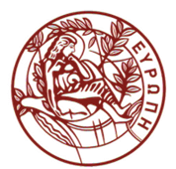Literature and study materials / reading list
1. Oikonomidis, V. & Eleftherakis. Th. (2009). Education, Democracy and Human Rights. Athens: Diadrasi. (In Greek, proposed to be distributed free).
2. Xrysafidis, K. (2009). Cross curricular thematic approach of knowledge. Athens: Diptyxo. (In Greek, proposed to be distributed free).
Literature and study materials / reading list:
Allen, R. (1996). “Introduction: What should we teach in Social Studies and why?” In B. Massialas & R. Allen (Eds.) Crucial Issues in Teaching Social Studies K – 12. Belmont: Wadsworth.
Ηooper-Greenhill, E. (1992). Museums and the shaping of knowledge. London: Routledge.
Ηooper-Greenhill, E. (1994). The Educational role of the museum. London: Routledge.
Ηooper-Greenhill, E. (1999). Museums and their visitors. London: Routledge.
Martorella, P. H. (1994). Social Studies for elementary school children. Developing young citizens. N.J. : Prentice-Hall.
Massialas, B. & Allen, R. E. (1996). Crucial issues in teaching social studies K-12. N.Y. : Wadsworth.
Mindes, G. (2005). Social studies in today’s early childhood curricula. Young Children, 60(5), 12-18.
O’ Hara, L. & O’ Hara, M. (2001). Teaching History 3-11: The essential guide. New York: Continuum.
Owen, D. & Ryan A. (2001). Teaching Geography 3-11: The essential guide. New York: Continuum.
Pluckrose, H. (1993). Children learning History. Herts: Simon & Schuster Education.
Ros, A. (2005). Teaching citizenship. Proceedings of the 7th conference of the children’s identity and citizenshipin Europe Thematic Network. London: CiCe.
Seefeldt, C. (2001). Social studies for the preschool/primary child.NJ: Merrill. Prentice Hall.
Seefeldt, C. & Barbour, N. (1998). Early Childhood Education. An introduction. N.J. :Merill, 4th ed.
Shaver, J.P. ( Ed), (1991). Handbook of research on Social Studies teaching and learning. N.Y. : Macmillan.

